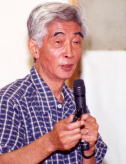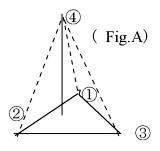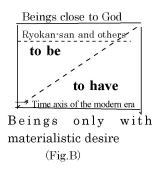m.PXO|R
tmdrbnf@o@@d
UNESCOfs Two Important Recommendations on Education
@On the second day of the 13th Retreat Prof. Eiji Hattori gave a lecture on two important documents that UNESCO has published concerning its educational philosophy.@The following is the summary of the lecture.
 @The first document is gEducation for the Twenty-first Centuryh, a recommendation on education to which UNESCO gave shape in 1997 after three years of work led by Jacques Delors, the president of the International Commission on Education for the Twenty-first Century.@It says that education promotes learning, and learning is based on four pillars:
@The first document is gEducation for the Twenty-first Centuryh, a recommendation on education to which UNESCO gave shape in 1997 after three years of work led by Jacques Delors, the president of the International Commission on Education for the Twenty-first Century.@It says that education promotes learning, and learning is based on four pillars:
@ gLearning to Knowh - acquiring knowledge just as you generally do at college
A gLearning to Doh - learning how to act in society
B gLearning to Live Togetherh - learning kyosei, (learning to live together in society)
@The Commission accepted the item B, adopting the suggestion made by Isao Amagi, the Japanese member.@The word gkyoseih is now in common use as an international word just as gjudoh.@The same idea is also found in a Japanese old word gtomo-ikih, which has often been used since the 13th century in the Jodo sect of Buddhism as well as other religions and thoughts.
C gLearning to Beh - learning the meaning of gto beh
@This is the concept that incorporates the first three concepts.@Regarding it as the concept that perpendicularly intersects the triangle with apexes @, A, and B would make it easier to understand.@(See Fig. A)
@ @@, A, and B alone can be comprehensive enough, and yet the inclusion of somewhat heterogeneous concept C is quite significant.@gLearning to Beh suggests greal beingh, and Ifd like to mention its philosophical background@- gBeing and Havingh written by Gabriel Marcel.@gBeingh and ghavingh are opposite concepts - they are in inverse proportion to each other.@One extreme is gGod has nothing; God is the very being.h@The other extreme is gthe incarnation of possessiveness; dehumanizationh.@Unfortunately the modern era has been heading for possessing gthingsh.@Historically, Ryokan-san, St. Francis of Assisi, and Mother Teresa of India, who loved people and were loved by them, who possessed nothing but lived a full life, may be considered to have been the ones close to God.@In the opposite extreme is Enron of America, a Mr. Suzuki of Japan, and many other people who are mad for money, who are far from what man should be.@Unbounded possessiveness and greed will ultimately lead to the end of mankind. (See Fig. B)
@@, A, and B alone can be comprehensive enough, and yet the inclusion of somewhat heterogeneous concept C is quite significant.@gLearning to Beh suggests greal beingh, and Ifd like to mention its philosophical background@- gBeing and Havingh written by Gabriel Marcel.@gBeingh and ghavingh are opposite concepts - they are in inverse proportion to each other.@One extreme is gGod has nothing; God is the very being.h@The other extreme is gthe incarnation of possessiveness; dehumanizationh.@Unfortunately the modern era has been heading for possessing gthingsh.@Historically, Ryokan-san, St. Francis of Assisi, and Mother Teresa of India, who loved people and were loved by them, who possessed nothing but lived a full life, may be considered to have been the ones close to God.@In the opposite extreme is Enron of America, a Mr. Suzuki of Japan, and many other people who are mad for money, who are far from what man should be.@Unbounded possessiveness and greed will ultimately lead to the end of mankind. (See Fig. B)
@The pillar gLearning to Beh teaches us the importance of gkyoseih, and further, the significance of living with a fuller realization of spiritual values.@That education should be carried out following that idea is what gto beh indicates, and that is UNESCOfs philosophy of education.@There are no other recommendations at present that surpass this one.
@The second document is the gUNESCO Universal Declaration on Cultural Diversityh, and in the limited time available Ifd like to talk about this declaration that UNESCOfs General Conference adopted in November 2001.@I think it is the most important declaration after the gUniversal Declaration of Human Rightsh.@Unfortunately there is not at present a Japanese translation that is written in a natural style and easy to read.@I do suggest that Meguro UNESCO perform such translation.@@@@@The trend of the world is towards globalization - ggrowing uniformityh, and that is a very dangerous direction.@In contrast to this trend, UNESCO regards gcultural diversityh as gessential to mankindh.@In 1995 at the United Nations University Jacques-Yves Cousteau said, gThe greater the number of species, the stronger the ecosystem.h@This law of nature, being true of mankind, led to the expression gCultural diversity is essential to mankindh.@And that is what Article 1 of the Declaration proclaims.
@As we are regrettably running out of time, Ifd like to give you a copy of the original text of the Declaration for your reference.@I expect you to read Article 2 and the following too, and ask me a lot of questions.
(The responsibility for the wording of this article lies with Yukio Okusawa, Chairperson,@Public Relations Committee.)
 @@The whole lecture transcribed by Tadashi Nakamura, member of the Training Program Committee, is on the Web site of Meguro UNESCO.@The whole text of gUNESCO Universal Declaration on Cultural Diversityh both in English and Japanese is also on our site
@@The whole lecture transcribed by Tadashi Nakamura, member of the Training Program Committee, is on the Web site of Meguro UNESCO.@The whole text of gUNESCO Universal Declaration on Cultural Diversityh both in English and Japanese is also on our site
next page
 @@The whole lecture transcribed by Tadashi Nakamura, member of the Training Program Committee, is on the Web site of Meguro UNESCO.@The whole text of gUNESCO Universal Declaration on Cultural Diversityh both in English and Japanese is also on our site
@@The whole lecture transcribed by Tadashi Nakamura, member of the Training Program Committee, is on the Web site of Meguro UNESCO.@The whole text of gUNESCO Universal Declaration on Cultural Diversityh both in English and Japanese is also on our site